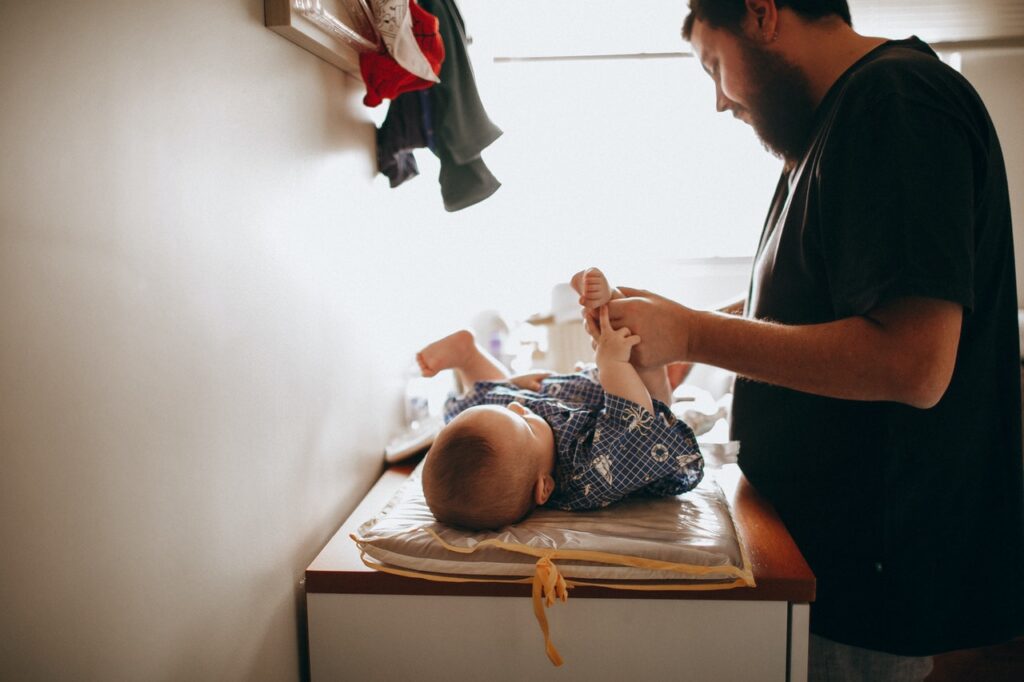
Eat, drink, and poop form an important part of a baby’s daily routine. It is because the fast-growing body needs to consume many calories and rest a lot. After all, a baby is expected to double bodyweight in about five months.
In adults, metabolism is much slower. For example, even a baby’s heart beats at twice the speed of an average adult. Thus, babies need to consume massive amounts of calories compared to their body weight. Moreover, they are predominantly on the liquid diet. All this means much greater pooping frequency.
Though excited by the child’s arrival, adults find it hard to comprehend a few things. For example, they struggle to understand that baby is eating every few hours and pooping at most unexpected times.
Moreover, newborns have the challenge of adapting to the new environment around them. In the womb, the baby lives in the darkness. They do not have any routine. However, after birth, the brain’s internal clock or circadian rhythm needs to adapt to the cycle of day and night.
This adaptation to the day and night cycle is quite a complex process controlled by the brain and a range of hormones. How circadian rhythm works is still not fully understood by science.
Nonetheless, science knows that the development of this internal clock is vital for human survival and good health. This is because it ultimately starts controlling all metabolic activities. So, for example, certain organs become more active during the day, while others, like the gastrointestinal tract, become less active.
 There is not much difference between the daytime and nighttime for a newborn. Thus babies continue eating during the night and pooping. However, things start changing from about 4-6 weeks onwards. During this age, their circadian rhythm starts working more or less effectively.
There is not much difference between the daytime and nighttime for a newborn. Thus babies continue eating during the night and pooping. However, things start changing from about 4-6 weeks onwards. During this age, their circadian rhythm starts working more or less effectively.
That is why experts recommend that parents should also take some steps to help a newborn baby. These days light pollution and gadgets are interrupting the circadian rhythm of adults and even negatively influencing the internal clock of babies.
Thus, parents should take extra care to switch off the lights at a fixed time. This would help the baby’s brain to regulate its internal clock better.
Of course, a baby would not stop pooping completely at 4-6 weeks. From this time onwards, the frequency of nighttime pooping would continually decline. However, it would take much longer for a baby to regularize its internal clock. Thus, most babies stop pooping, almost wholly, only at about 3-4 months. After that, it becomes a rare event.
Here one needs to understand the individual differences, too. These days parents do lots of study before and after having a child. However, they tend to forget that there are no hard and fast rules. Some children stop pooping after a couple of months; others keep pooping at night much longer.
There are also significant differences in the bowel size of babies. As babies grow, so does their ability to hold more in their tummy.
Additionally, it is vital to understand that nighttime pooping can be reduced by letting the baby sleep for longer. This is not just good for a growing body but also helps regularize the body’s internal clock.
Helping your baby stop pooping at night without interrupting the sleep
As already suggested that pooping at night is a normal part of growing. Thus, it is not something that needs treatment. However, parents can take a few steps to ensure that the child sleeps well at night and that pooping does not disturb sleep. This would help regularize the circadian rhythm faster and thus help prevent nighttime pooping.
Some of the tips to help children sleep well and prevent poop from disturbing sleep could be:
Use diaper cream
this would help prevent diaper irritation. It will also protect the tender skin from irritation of infections.
 Help a child develop a routine
Help a child develop a routine
it isn’t easy and takes time; nonetheless, one can do it in many ways, like playing with a child, which would help a baby stay active and poop during the daytime. Similarly, start sleeping at a fixed time and follow sleep hygiene, like switching off all the lights at a specified time.
Give baby time to digest
it means that avoid putting your baby in the crib immediately after feeding. Instead, after feeding, play a bit, and give your child time to digest food.
Help your baby stay hydrated
despite being on a liquid diet. Some babies are prone to constipation. Thus, help your child stay hydrated.
Maintain a food log
it is vital, especially if the baby poops too frequently during the night. It may be due to some food intolerances. Keeping a food log may help identify if your child poops after certain foods. This would also help get medical help early for food intolerance.
Try to adjust your routine
another problem is that parents expect a child to adapt according to their routine. However, babies prefer listening to biological clocks. Thus, if a child poops early in the morning, make it a habit to get earlier.
To conclude, a baby may almost stop nighttime pooping after the age of about six weeks. However, most babies would stop pooping at night only when 3-4 months of age. Therefore, nighttime pooping is not a cause of worry, though it causes distress to parents.
The young body needs time to adapt to the day-night cycle, to normalize its circadian rhythm. Parents can help a child by taking some simple measures. For example, they should avoid waking up the baby to change diapers. Instead, help improve routine so that a baby quickly gets used to things and develops certain habits or routines.

 Help a child develop a routine
Help a child develop a routine


 Dr. Preet Pal SB is a physician (M.D. Medicine) with a specialization in diabetes (Fellowship in diabetes, Royal Liverpool Academy). He has a particular interest in metabolic disorders, considering that they are rising in every corner of the world, more so in India.
Dr. Preet Pal SB is a physician (M.D. Medicine) with a specialization in diabetes (Fellowship in diabetes, Royal Liverpool Academy). He has a particular interest in metabolic disorders, considering that they are rising in every corner of the world, more so in India.